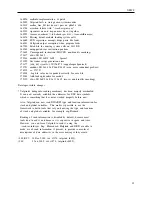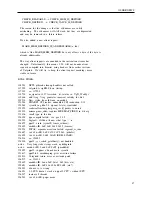
OLDER NEWS
122067
amd64: fcmovnu (0xDB 0xD9)
n-i-bz
ppc32: broken signal handling in cpu feature detection
n-i-bz
ppc32: rounding mode problems (improved, partial fix only)
119482
ppc32: mtfsb1
n-i-bz
ppc32: mtocrf/mfocrf
(3.1.1:
15 March 2006, vex r1597, valgrind r5771).
Release 3.1.0 (25 November 2005)
~~~~~~~~~~~~~~~~~~~~~~~~~~~~~~~~
3.1.0 is a feature release with a number of significant improvements:
AMD64 support is much improved, PPC32 support is good enough to be
usable, and the handling of memory management and address space is
much more robust.
In detail:
- AMD64 support is much improved.
The 64-bit vs. 32-bit issues in
3.0.X have been resolved, and it should "just work" now in all
cases.
On AMD64 machines both 64-bit and 32-bit versions of
Valgrind are built.
The right version will be invoked
automatically, even when using --trace-children and mixing execution
between 64-bit and 32-bit executables.
Also, many more instructions
are supported.
- PPC32 support is now good enough to be usable.
It should work with
all tools, but please let us know if you have problems.
Three
classes of CPUs are supported: integer only (no FP, no Altivec),
which covers embedded PPC uses, integer and FP but no Altivec
(G3-ish), and CPUs capable of Altivec too (G4, G5).
- Valgrind’s address space management has been overhauled.
As a
result, Valgrind should be much more robust with programs that use
large amounts of memory.
There should be many fewer "memory
exhausted" messages, and debug symbols should be read correctly on
large (eg. 300MB+) executables.
On 32-bit machines the full address
space available to user programs (usually 3GB or 4GB) can be fully
utilised.
On 64-bit machines up to 32GB of space is usable; when
using Memcheck that means your program can use up to about 14GB.
A side effect of this change is that Valgrind is no longer protected
against wild writes by the client.
This feature was nice but relied
on the x86 segment registers and so wasn’t portable.
- Most users should not notice, but as part of the address space
manager change, the way Valgrind is built has been changed.
Each
tool is now built as a statically linked stand-alone executable,
rather than as a shared object that is dynamically linked with the
core.
The "valgrind" program invokes the appropriate tool depending
on the --tool option.
This slightly increases the amount of disk
space used by Valgrind, but it greatly simplified many things and
removed Valgrind’s dependence on glibc.
Please note that Addrcheck and Helgrind are still not working.
Work
is underway to reinstate them (or equivalents).
We apologise for the
49
















































